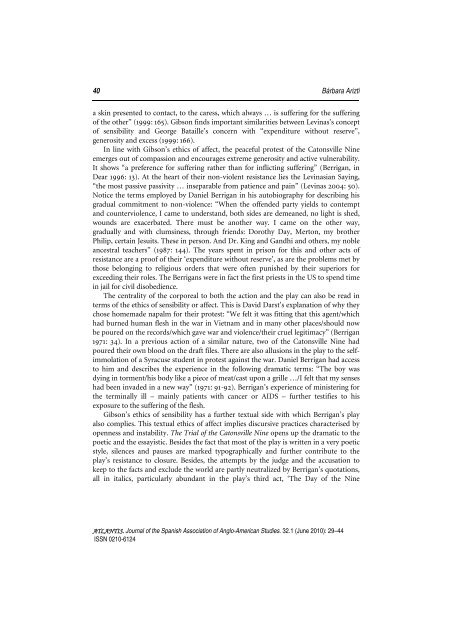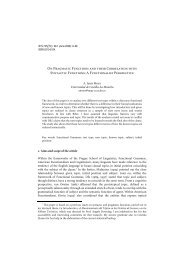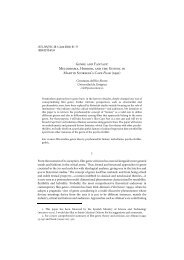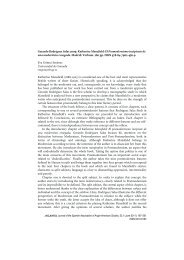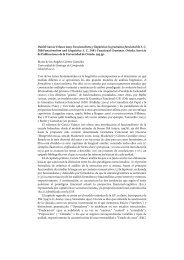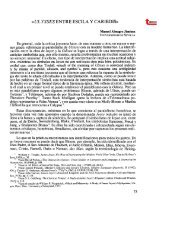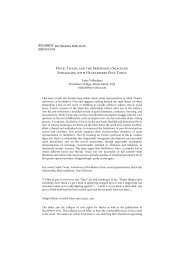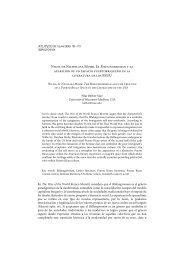Revista de la Asociación Española de Estudios Anglo - Atlantis
Revista de la Asociación Española de Estudios Anglo - Atlantis
Revista de la Asociación Española de Estudios Anglo - Atlantis
Create successful ePaper yourself
Turn your PDF publications into a flip-book with our unique Google optimized e-Paper software.
40 Bárbara Arizti<br />
a skin presented to contact, to the caress, which always … is suffering for the suffering<br />
of the other” (1999: 165). Gibson finds important simi<strong>la</strong>rities between Levinas’s concept<br />
of sensibility and George Bataille’s concern with “expenditure without reserve”,<br />
generosity and excess (1999: 166).<br />
In line with Gibson’s ethics of affect, the peaceful protest of the Catonsville Nine<br />
emerges out of compassion and encourages extreme generosity and active vulnerability.<br />
It shows “a preference for suffering rather than for inflicting suffering” (Berrigan, in<br />
Dear 1996: 13). At the heart of their non-violent resistance lies the Levinasian Saying,<br />
“the most passive passivity … inseparable from patience and pain” (Levinas 2004: 50).<br />
Notice the terms employed by Daniel Berrigan in his autobiography for <strong>de</strong>scribing his<br />
gradual commitment to non-violence: “When the offen<strong>de</strong>d party yields to contempt<br />
and counterviolence, I came to un<strong>de</strong>rstand, both si<strong>de</strong>s are <strong>de</strong>meaned, no light is shed,<br />
wounds are exacerbated. There must be another way. I came on the other way,<br />
gradually and with clumsiness, through friends: Dorothy Day, Merton, my brother<br />
Philip, certain Jesuits. These in person. And Dr. King and Gandhi and others, my noble<br />
ancestral teachers” (1987: 144). The years spent in prison for this and other acts of<br />
resistance are a proof of their ‘expenditure without reserve’, as are the problems met by<br />
those belonging to religious or<strong>de</strong>rs that were often punished by their superiors for<br />
exceeding their roles. The Berrigans were in fact the first priests in the US to spend time<br />
in jail for civil disobedience.<br />
The centrality of the corporeal to both the action and the p<strong>la</strong>y can also be read in<br />
terms of the ethics of sensibility or affect. This is David Darst’s exp<strong>la</strong>nation of why they<br />
chose homema<strong>de</strong> napalm for their protest: “We felt it was fitting that this agent/which<br />
had burned human flesh in the war in Vietnam and in many other p<strong>la</strong>ces/should now<br />
be poured on the records/which gave war and violence/their cruel legitimacy” (Berrigan<br />
1971: 34). In a previous action of a simi<strong>la</strong>r nature, two of the Catonsville Nine had<br />
poured their own blood on the draft files. There are also allusions in the p<strong>la</strong>y to the selfimmo<strong>la</strong>tion<br />
of a Syracuse stu<strong>de</strong>nt in protest against the war. Daniel Berrigan had access<br />
to him and <strong>de</strong>scribes the experience in the following dramatic terms: “The boy was<br />
dying in torment/his body like a piece of meat/cast upon a grille …/I felt that my senses<br />
had been inva<strong>de</strong>d in a new way” (1971: 91-92). Berrigan’s experience of ministering for<br />
the terminally ill – mainly patients with cancer or AIDS – further testifies to his<br />
exposure to the suffering of the flesh.<br />
Gibson’s ethics of sensibility has a further textual si<strong>de</strong> with which Berrigan’s p<strong>la</strong>y<br />
also complies. This textual ethics of affect implies discursive practices characterised by<br />
openness and instability. The Trial of the Catonsville Nine opens up the dramatic to the<br />
poetic and the essayistic. Besi<strong>de</strong>s the fact that most of the p<strong>la</strong>y is written in a very poetic<br />
style, silences and pauses are marked typographically and further contribute to the<br />
p<strong>la</strong>y’s resistance to closure. Besi<strong>de</strong>s, the attempts by the judge and the accusation to<br />
keep to the facts and exclu<strong>de</strong> the world are partly neutralized by Berrigan’s quotations,<br />
all in italics, particu<strong>la</strong>rly abundant in the p<strong>la</strong>y’s third act, ‘The Day of the Nine<br />
ATLANTIS. Journal of the Spanish Association of <strong>Anglo</strong>-American Studies. 32.1 (June 2010): 29–44<br />
ISSN 0210-6124


